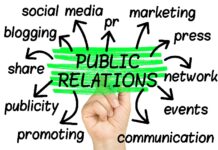In 20 years in public relations and marketing for corporations to small businesses and author of Pitched DIY PR guide, there is one thing I know for certain; PR seems to be a big mystery.
I went to Journalism school to learn it. I taught it and wrote a book on it. Businesses understand it’s value and that they need it, but don’t quite understand how it actually works. Moreover, everyone has their own opinions about PR, leading to a lot of confusion on exactly what PR is, and what it isn’t.
I have had clients say their last PR person only managed their social media, wrote a press release and posted it or responded to Help A Reporter Out queries. While these are elements within a PR strategy, they are not the primary work of PR.
As a professional, I am finally removing the veil of mystery to answer your top questions about public relations.
Q: What exactly is public relations?
This is a question I get frequently. Like I said, everyone seems to have their own idea of PR, especially those who are not professionals like me. I see these opinions in all kinds of startup FB groups and small business discussions or networking sites.
To make matters worse, the concept of PR becomes even more cluttered with the additional roles of social media, internal relations, influencers and events. And, while there are many things that can go into a business’s PR strategy, there is one reason the art of PR works.
Public relations, by definition is how you relate to your publics, or audiences. What most people understand to be PR, and how the practice originally began, is how to communicate the value and benefit of your business, product or service through a third party. The most influential third-party endorsement is media – positive interviews and stories. Everyone understands its value, and hence desire to attract media attention.
People want good PR because it drives a positive perception of their business in the media, through amplification of a story on social media, and also by including the media outlet’s logo on your website’s homepage.
The journalistic role of PR helps create a great company story that you then carry consistently through to all of your marketing – news media, social media, digital ads, blog and content development.
Recap: The basic of PR is creating opportunities with people with perceived influence, through a compelling story, to tell your story for you – like media.
The goal of PR is to communicate, generate awareness and engage your audience. You promote your PR – endorsements or good word of mouth – to other audiences through social media, websites, sales and marketing materials, etc.

Q: What PR is not?
Public relations is not advertising It is not just social media management. It is not just writing press release after press release and posting on every press release distribution site there is and waiting for someone to call (Don’t cry wolf). Public relations is not responding to relevant Help A Reporter Out queries. Public relations is not just blogging and content development. PR is not SEO, even though it can assist in enhancing it. These are all valuable parts of your PR strategy, they are benefits of PR, but alone they are not PR.
Q: How does PR work?
The thing about PR is that it is the most powerful marketing tool in the box, but it operates completely different than all of the other elements (like advertising, design). PR is a journalism-based industry that requires the ability to think like a journalist to create a newsworthy story that will entice journalists to write a story on your business or include it in a product round up story.
A great public relations campaign starts with a newsworthy story that you pitch proactively to media as a story idea for their audience. A great story defines the “Why” of your business that is of interest to your audience (meets a need, solves a problem) and in turn the media outlet. The “Why” is what generates interest, clicks and sales.
For example, which one do you find more newsworthy?
1. XYZ company announced today the launch of its new product the CarTable making it more convenient for people to eat while driving in the car.
2. In 2017, 54% of all car accidents were caused by people eating in the car. XYZ company launched its new CarTable to help reduce driver distraction and accidents.
If you picked #2, you’re right. The “why” of the invention becomes much more compelling accompanied by statistics. That number tells a journalist right off the bat that his invention could save lives, and that is a news story. Oftentimes, it’s just changing the way you tell the story. You want to stop selling your story and start telling it.
Q: Why is PR so powerful, especially for small business and startups?
Public relations has the unique ability to build valuable credibility. When you see someone you perceive as a credible, reputable journalist, or media outlet, mention a business, product or service, you’re 10 times more likely to buy it, or at least click through to the website to learn more. Cleverly-written digital ads may drive clicks, but once they get to your site and see media logos, that’s where they say “Wow, I should take a deeper look at this to see if it meets my needs.” Credibility.
PR is the only marketing element that can provide this kind of powerful credibility for a business. And, credibility creates a positive perception of your business in the minds of customers.
It doesn’t matter if you are working or launching from home or you’re already in growth mode, there are a variety of ways to attract media and build credibility.
Note: Media stories can and will drive traffic to your website, but if you’re website fails to connect and convert to sales, then you may be left feeling it was a waste. They must work hand in hand.

Q: How is PR different from advertising?
Advertising is PAID. PR is EARNED. Earned meaning, you contacted the reporter, pitched the story, followed up as needed, they responded and said yes. You earned the story, you did not pay for it.
Yes, many local and hyper-local media, especially magazines, have become pay-to-play, or total advertising with no opportunities for earned media stories. While earned is the most desired, both can have roles in your marketing strategy, especially since most paid appear as “advertorials” or paid editorial – looks like a story, reads like a story but you paid for it. The reasoning is that people are more likely to read it if it doesn’t completely reek of advertising.
Q: We tried PR before and it didn’t work?
Chances are you didn’t have a strong enough story. A compelling story to the right media outlet always works. A great story thought out to be customized for the visual needs of TV verses newspaper, works every time. Understanding the media and how it works can make a big difference. Making sure that you are targeting the right journalists, who would be most interested in your story, makes a big difference.
I recommend taking an honest look at your company’s story and ask yourself if it would get your attention. Then, begin to rework it to so that it will be of interest to media.
Q: Who do you know in the media that can help my business?
Everyone asks this question, and I understand, that, like in sales, my relationships with media can mean some sort of “guarantee” for clients, or quick hits. However, the reason I have those relationships is because media know and trust that I will always give them a great story, because I do. I am known for my nose for news and how to customize a story to meet the needs of print, digital, TV, radio, etc.
Here is the reality:
1. It doesn’t matter who I know if the story is not strong. My media contacts will still tell me no.
2. In today’s media industry, someone I know today could be gone tomorrow and the only way to still get a story from that media outlet is to offer a great story.
To recap: I know a lot of people, however a great story will land interest whether I have relationships at that outlet or not. Also, there are literally millions of writers, contributors, producers and more out there. It’s impossible to have a relationship with them all.

Q: Are you willing to be paid by placement?
I love this question and my response is “do you ask your attorney whether they are willing to be paid based on specific outcomes?” No. You don’t. Not to mention, this practice is deemed unethical by the Public Relations Society of America.
I get it. People are afraid to make a financial commitment without guarantees. The thought that you might not get any media and still have to pay your agency can make you cautious. There’s no guarantee you will win a lawsuit, either.
This concept is attractive to many small businesses and startups because they believe 1. Get the media story, 2. It will drive traffic and generate revenue, 3. You will be able to pay the agency.
I am here to tell you, that outside of being seen as an unethical industry practice, someone who says yes to this question will ultimately cost you a lot more down the road. It always sounds too good to be true, and it is. Like wise someone who comes in ridiculously inexpensive…you get what you pay for.
Find and hire someone you trust. Someone who will be honest, help develop a strong story and advise on when to pivot, if needed.
Q: How long will it be before I see results?
Everyone wants immediate results for a few reasons; 1. Builds faith that the agency can and will provide results, 2. Potential for immediate sales. However, there are factors that even we PR people have to deal with:
1. We can control other people like we can control the weather – meaning we can’t force anyone to do the story Right. Now.
2. Deadlines – every media outlet plans and works differently
3. Journalists do have other stories they’re working on and not likely to drop everything just for you
4. They are bombarded by hundreds of email pitches per day
5. Acts of God can take over the news cycle, pushing back or even killing stories unexpectedly
Our job is to navigate all of this and help you break through the clutter.
Public relations is very similar to sales. We professionals create a great product (story) and package it into news and sell it to media. There is an intangibility to PR like sales. It’s the time in between when you’re actually selling, or pitching media, before you see the sale or story. That makes a lot of business owners nervous about what their agency is really doing. Ask for a weekly update report.
It’s important to remember that media have a variety of deadlines and other factors we have to consider. For instance, a magazine can interview you for a story today, but it may not come out for four months. On the flip side, you may have a great story, but a writer puts it on file for a story they’re working on in three months but doesn’t email to let you know. Television often books up to six weeks out…We pros are constantly researching what media are writing on, what’s trending and thinking about timing and deadlines to ensure our clients get all of the media attention they desire and deserve.
Public relations requires patience and planning. However, like I’ve said time and again, a great story goes a long way in driving results.
Quality is always more important than quantity.
My final piece of advice is that more is not always better. For instance, you can have 100 unknown bloggers write about your product and nothing happens or spend time on one well-known media outlet and you have 400 orders the night the story comes out. I seriously bootstrapped a media tour to NYC with a startup client and landed two high quality media, including USA Today, that helped launch the business and generated interest from potential partner, and a few smaller “media” and influencers that had little impact.
Find a Home-Based Business to Start-Up >>> Hundreds of Business Listings.

















































